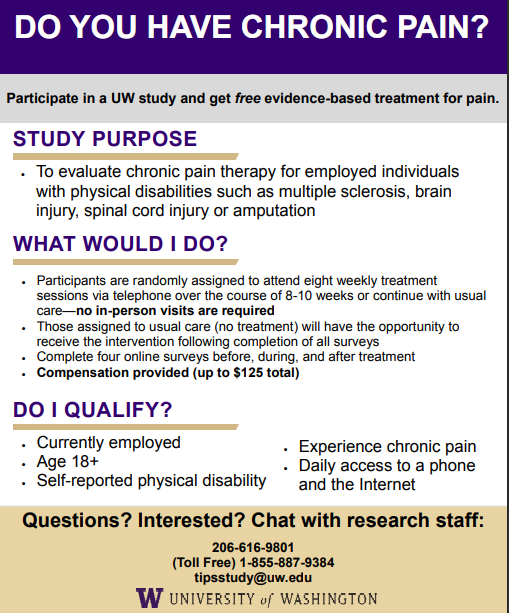Research Opportunities
Brain Injury Association of South Carolina wants to ensure you have the most up-to-date information regarding interactive research opportunities, ambassador programs, and volunteer positions as a brain injury survivor or family member/caregiver.
See opportunities below and make sure to check back often for updates and additions to this information!
Alternative Text for Image:
Flyer about the ETIPS Study. It says: Do you have chronic pain Participate in a UW study and get free evidence-based treatment for pain. Study Purpose: to evaluate chronic pain therapy for employed individuals with physical disabilities such as multiple sclerosis, brain injury, spinal cord injury or amputation. What Would I Do? Participants are randomly assigned to attend eight weekly treatment sessions via telephone over the course of 8-10 weeks or continue with usual care - no in-person visits are required. Those assigned to usual care (no treatment) will have the opportunity to receive the intervention following completion of all surveys. Complete four online surveys before, during, and after treatment. Compensation provided (up to $125 total). Do I Qualify? Currently employed. Age 18+. Self-reported physical disabilities. Experience chronic pain. Daily access to a phone and the internet. Questions? Interested? Chat with research staff: 206-616-9801 (Toll Free) 1-855-887-9384 tipsstudy@uw.edu. University of Washington.
Chronic pain is one of the most prevalent, disabling, and persistent comorbid conditions associated with physical disabilities, including limb loss, spinal cord injury, traumatic brain injury, and chronic neurodegenerative conditions such as multiple sclerosis. One half to two-thirds of adults with these conditions experience chronic pain. In addition to being associated with disability, depression, sleep disruption, and physical inactivity, chronic pain has deleterious social and societal costs, including job loss and reliance on long-term disability programs.
The E-TIPS intervention aims to address common barriers encountered by employed individuals with chronic pain. People with physical disabilities may be offered face-to-face delivery of pain self-management interventions, in clinical settings during business hours, which limits access to people with physical disabilities who are employed. These individuals must take time off work to attend multiple treatment sessions, overcome transportation difficulties, and contend with the stigma of seeking behavioral healthcare. Telehealth interventions, such as E-TIPS, have considerable potential for expanding the reach of pain self-management interventions for employed people with physical disabilities.
The proposed randomized (1:1), single-blind parallel-group trial will compare the E-TIPS telehealth pain self-management intervention to a waitlist control in adults with physical disabilities and chronic pain who are employed. Outcomes will be assessed before randomization, mid-treatment (6 weeks post-randomization), post-treatment (12 weeks post-randomization; primary endpoint), and 6-month follow up (38 weeks post-randomization).
Questions? Interested? Chat with research staff:
206-616-9801
(Toll Free) 1-855-887-9384
tipsstudy@uw.edu
To learn more about this study and/or to participate, click this link for E-TIPS research study information.
Ipsen Biopharmaceuticals, Inc., is currently looking for post-stroke patients living with spasticity and their caregivers who are interested in joining Ipsen’s Ambassador Program. Ambassadors empower other patients and caregivers by sharing their experiences, raising disease awareness, and helping to motivate each other.
Do you have a story to tell about your journey living with or taking care of a loved one with post-stroke spasticity? Would you like to become an Ambassador and share your story to help others? If yes, please contact Ipsen at: patient.ambassador@ipsen.com for more information.
Researchers at Case Western Reserve University are conducting a study about TBIs in children.
This is a study to learn about the role of social communication on social behavior in children, reported by parents and caregivers. Participants will be asked to complete an intake phone call (about 10-15 minutes), and to fill out questionnaires regarding their child's social communication and social behavior abilities (about 30-45 minutes).
You are eligible to participate in this survey if:
You are a parent or caregiver of a child who sustained a brain injury of any severity (concussion/mTBI, TBI, severe TBI, etc.)
Your child sustained a brain injury after 6 months of age
Your child is currently between the ages of 6-18 years
It has been at least 6 months since your child's brain injury
Participants will be compensated for their time with a gift-card.
For more information about this study, contact Libby Crook at 216-282-6037 or libby.crook@case.edu, or Dr. Sarah Hope Lincoln at sarahhope.lincoln@case.edu.



